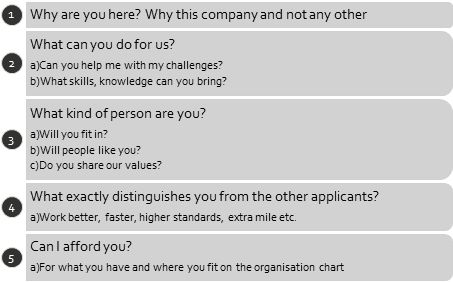5 Questions that an employer wants to answer: Companies are looking more and more for emotional intelligence:
Companies are looking more and more for emotional intelligence:
- Self-awareness (understanding of your own motives and actions)
- Self-management (the ability to control your own impulses and urges)
- Self-motivation (the ability to drive towards goals without waiting to be told all the time)
- Empathy (The ability to see a situation from another person’s perspective)
- Social skills (The ability to adjust the way you talk to other people’s personalities and situations)
Preparation for Interview
- Don’t show desperation:
- Before a job interview, or date, try to think of yourself as considering the role rather than hoping to get chosen
- Don’t say “I’m a really hard worker” or” I’m passionate about XYZ” – Instead, tell stories about how you are hard-working, honest or with wit
- At the interview: In the reception, stand and look busy. On entering the interview room, walk in without hesitation, put bag down and shake hands looking at each person in the room.
- In an interview – shake hands, then give the interviewer 2-3 seconds to look you up and down Do this by looking down to open a briefcase or folder, turn to hang up clothing and then look up, (Pease, et al., 2008)
Engaging Interview Stories
This is a technique to develop useful anecdotes for interviews or presentations. Think of a goal that you achieved, and what you did with a measurable outcome at the end. The story could be about:
- Something abnormal or unusual to normal life (e.g. climbing a mountain)
- Reveals your skills in a public way
- Is in a field far from work
- Is a challenge – something you previously couldn’t do
- Is something you would like to do in another setting
- Is something that excited you (because it was something you’d never done, had a risk, needed persistence etc)
| Situation 1 | Situation 2 | |
| What happened before? | ||
| Who was involved? | ||
| What happened during? | ||
| How did you feel? | ||
| What did you see? | ||
| What did you think? | ||
| What did you do? | ||
| What was the result? | ||
| What skills and attitudes did you display? |
How do you know you’ve succeed in describing a situation and your behaviours?
- Past. Behaviours are descriptive of a specific situation that took place in the past.
- Unambiguous. The role of the candidate in the situation is crystal clear.
- Context. Behaviours include context – the people involved in the situation and its history.
- Picture. A detailed picture is created through what the candidate did, said, thought, or felt as the situation unfolded